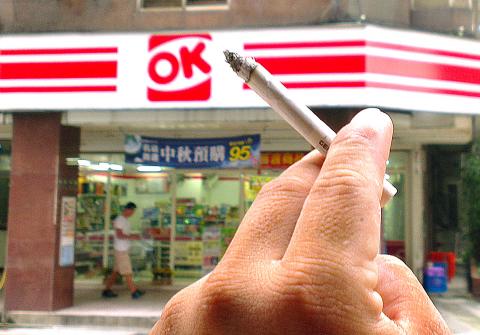More than 60 percent of stores in the nation have been found to violate the Tobacco Hazards Prevention Act (菸害防制法) and sell tobacco products to minors, according to a latest report published by the Consumers’ Foundation.
The legally recognized age in Taiwan is 20 years old.
The report, commissioned by the Ministry of Health and Welfare, said betel nut stands and convenient stores were the most common offenders, adding that among convenience stores, OK-mart was the worst offender, with 57.1 percent of its stores selling tobacco products to minors.

Hi-Life came in second at 52.9 percent, and 7-Eleven and Family
Mart came in third and fourth at 47.9 and 42.2 percent respectively, the report said.
The poll took samples from 22 counties and cities from May to October last year, Feng Tsung-yi (馮宗蟻), head of the ministry’s division of health education and prevention of tobacco control said.
“We looked at a total of 550 locations — including the four largest convenience store chains, supermarket chains, hypermarkets, betel nut stands and traditional convenience stores — and gauged the reaction of clerks at the counter when customers — ranging from 18-year-old college students to high-school students still wearing their uniforms — bought cigarettes,” Feng said.
Betel nut stands were the worst offenders over all, with 78.4 percent of stands willing to sell cigarettes to minors, Feng said, adding that traditional convenience stores were the second worst, coming in at 67.3 percent.
The poll results show that the percentage of offenders is appallingly high, and the offenders among the four largest convenience store chains have increased last year’s average of 29.3 percent across all four stores to 47.8 percent this year, an increase of 18.5 percentage points, Feng said.
It is the largest increase among tobacco retailers, Feng said.
According to the law, violators selling tobacco products to minors under 18 years of age can be fined a maximum of NT$50,000.
In response, OK-Mart said it would step up its training regimen and increase the policing of its retail branches.
Hi-Life said that newly joined stores have all been given training on the proper handling and sales of tobacco products, adding that the chain took special care in reinforcing the rules for stores near schools.
Meanwhile 7-Eleven and FamilyMart said they strictly enforced the rule that retail branches must not sell tobacco products to minors.

US climber Alex Honnold is to attempt to scale Taipei 101 without a rope and harness in a live Netflix special on Jan. 24, the streaming platform announced on Wednesday. Accounting for the time difference, the two-hour broadcast of Honnold’s climb, called Skyscraper Live, is to air on Jan. 23 in the US, Netflix said in a statement. Honnold, 40, was the first person ever to free solo climb the 900m El Capitan rock formation in Yosemite National Park — a feat that was recorded and later made into the 2018 documentary film Free Solo. Netflix previewed Skyscraper Live in October, after videos

NUMBERS IMBALANCE: More than 4 million Taiwanese have visited China this year, while only about half a million Chinese have visited here Beijing has yet to respond to Taiwan’s requests for negotiation over matters related to the recovery of cross-strait tourism, the Tourism Administration said yesterday. Taiwan’s tourism authority issued the statement after Chinese-language daily the China Times reported yesterday that the government’s policy of banning group tours to China does not stop Taiwanese from visiting the country. As of October, more than 4.2 million had traveled to China this year, exceeding last year. Beijing estimated the number of Taiwanese tourists in China could reach 4.5 million this year. By contrast, only 500,000 Chinese tourists are expected in Taiwan, the report said. The report

Temperatures are forecast to drop steadily as a continental cold air mass moves across Taiwan, with some areas also likely to see heavy rainfall, the Central Weather Administration (CWA) said. From today through early tomorrow, a cold air mass would keep temperatures low across central and northern Taiwan, and the eastern half of Taiwan proper, with isolated brief showers forecast along Keelung’s north coast, Taipei and New Taipei City’s mountainous areas and eastern Taiwan, it said. Lows of 11°C to 15°C are forecast in central and northern Taiwan, Yilan County, and the outlying Kinmen and Lienchiang (Matsu) counties, and 14°C to 17°C

STEERING FAILURE: The first boat of its class is experiencing teething issues as it readies for acceptance by the navy, according to a recent story about rudder failure The Hai Kun (海鯤), the nation’s first locally built submarine, allegedly suffered a total failure of stern hydraulic systems during the second round of sea acceptance trials on June 26, and sailors were forced to manually operate the X-rudder to turn the submarine and return to port, news Web site Mirror Daily reported yesterday. The report said that tugboats following the Hai Kun assisted the submarine in avoiding collisions with other ships due to the X-rudder malfunctioning. At the time of the report, the submarine had completed its trials and was scheduled to begin diving and surfacing tests in shallow areas. The X-rudder,